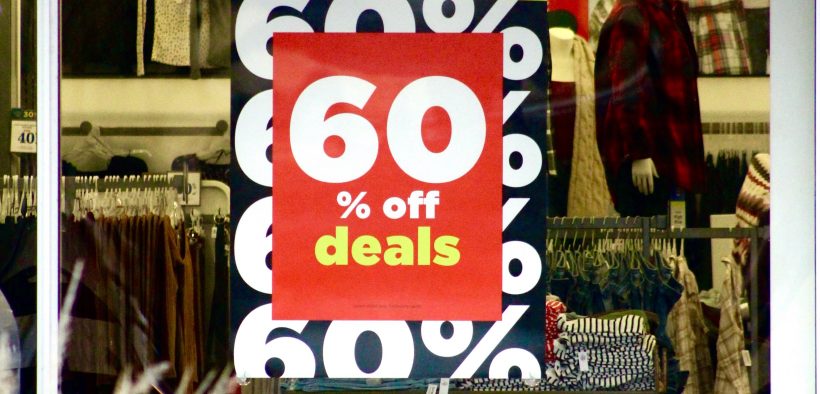The Fall of Black Friday and the Rise of Cyber Monday
Share

What image comes to mind when you picture Black Friday? My family never participated in Black Friday shopping while I was growing up, but I always had a very vivid mental image of the American consumerist tradition. I envisioned families battling their way through mobs of manic customers to reach the end of a checkout line that snaked the perimeter of a department store. I imagined shopping centers, full to capacity, with eager shoppers bouncing from hot deal to hot deal. I fantasized about glorious, jaw-dropping deals like $75 for the latest Apple Watch or $50 Golden Goose sneakers.
In November of 2019, my friend and I decided we’d brave the masses at NorthPark Center— the most bustling shopping mall in Dallas. We set out on a quest— not to secure the greatest steals or purchase any particular merchandise— but to experience Black Friday to the fullest. We set our alarms for 6 AM to arrive at the mall before the crack of dawn, fully equipped with Red Bull energy drinks in hand. Upon arrival, we were dismayed by an almost entirely vacant parking lot. We were prepared to get trampled by frenzied shoppers, but we instead found ourselves scavenging department stores for the slightest smidge of stimulation. For a couple of hours, we circled the mall, shaking our heads at the utter lack of commotion. We drove to Kohls in hopes of a change of pace. However, we were disappointed to discover the same dead scene.

Photo By Iris Dannelley
Black Friday is simply not what it used to be. It is no longer the annual American craze we all remember from our childhood Thanksgiving movies. Black Friday has been tragically replaced by Cyber Monday. So who’s the guilty culprit? Who killed Black Friday? None other than the Internet. The Internet is guilty, but not yet convicted of turning Black Friday into Cyber Monday. The internet is still on the loose and formulating its next heist to take over yet another beloved annual tradition. Black Friday is dead, and it is only number one on the hit list. Valentine cards are being replaced with GIFs of teddy bears with roses. Rather than executing an elaborate April Fools Day prank, people now opt to send a misleading, out-of-pocket text message for a quick and convenient laugh. Instead of lending a hand at a local trash pickup event on Earth Day, people convince themselves they are “doing their part” by adding a “Protect Mother Earth” post to their Instagram stories.
I encourage you to question the true reasons behind your technology usage and consider whether or not you feel that it is adding value to your life. People often forget that just because we have the technology to accomplish something, this does not necessarily mean we should always use it.
One of my favorite quotes is by Journalist Sydney Harris: “The real danger is not that computers will begin to think like men, but that men will begin to think like computers.”
Do you think computers care if their data files have meaning or value? No, computers care about algorithms and efficiency. Computers care about simplifying the process – exactly what we care about when we’re online shopping. Day by day, our thinking patterns coincide more and more with that of our smartphones. Smartphones are not programmed to think critically or analyze a situation. They are not even capable of intuitive or empathetic thought. Hence, as we become more and more reliant on phones in our daily tasks, these are the exact skill sets we are gradually losing in ourselves. Smartphones recurrently strip us out of the present moment and into a pixelated screen. To make matters worse, they alter our neural pathways so that we don’t mind this reality at all. When asked a question we do not have an answer to, our immediate inclination is to Google it, rather than to think critically about the issue and come to our own conjecture. Technology’s predominant presence in today’s society has altered our perception of reality and overpowered our autonomous thought. It has shifted our priorities away from creating memories shopping with loved ones and towards the short-term gratification supplied through a digital screen.
Ask yourself: How much life experience are you willing to sacrifice for the sake of convenience? If we all work to be more cognizant of our reliance on the Internet, maybe we can bring Black Friday back from the dead. There is no better time than now— when we have finally broken out of the pandemic— to appreciate a lively and tangible world that is not trapped in a mobile device. I, personally, could not help but roll my eyes the few times my professors asked to meet over Zoom rather than in person, this school year. This holiday season, we should be thankful that we can go out and shop in an overcrowded shopping mall. Today, I encourage you to participate in Black Friday, but not through your phone screen. This is a day to create valuable, long-lasting memories with your friends and family. You should set out on a mission to cop the best bargains at your favorite stores. If you couldn’t fit Black Friday shopping into your schedule, instead of participating in Cyber Monday, pop into your local small businesses for Small Business Saturday!
